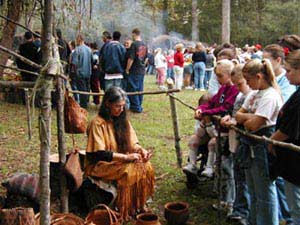By Angela Garnett-Garner and William St. Pierre
Kentucky Native American Heritage Commission
Stanford has become the first city in Kentucky to recognize “Indigenous Peoples’ Day” in reconsideration of the annual Columbus Day observance. Located in Lincoln County, one of the three original counties in Kentucky, Stanford was settled in 1775. Originally known as St. Asaph, and a year later as Logan’s Fort, it is the second oldest permanent settlement in the state.
As members of the Kentucky Native American Heritage Commission (KNAHC), we provided leadership to this body by authoring a model proposal for an Indigenous Peoples’ Day observance in Kentucky.
The KNAHC is a gubernatorial-appointed state commission administratively attached to the Kentucky Heritage Council/State Historic Preservation Office. Among its many roles, the commission educates and communicates the rich diversity and heritage of Native American peoples in Kentucky.
We approached Stanford mayor Eddie Carter with the idea of recognizing Oct. 9, 2017 as Indigenous Peoples’ Day. Consideration and final approval of such a proclamation came from the Stanford City Council during a special meeting Sept. 19 in which we spent more than two hours answering questions and explaining the intent of the commemoration.

Learning the culture
With this bold step by the city, a public event is now planned for Oct. 9 to proclaim this special day in the city, which will feature indigenous music and include members of the Native American community, state and local government speakers, and other invited guests.
The Indigenous Peoples’ Day movement in the US began in the 1990s in California, and over the years a number of communities and states have come to recognize this day instead of (or as in the case of Stanford, in addition to) Columbus Day.
As a federal holiday, Columbus Day has been recognized since 1937. Several states including Alaska, Hawaii, Oregon and South Dakota celebrate “American Indian (or Indigenous Peoples’) Day” instead of Columbus Day. Many cities, school districts, colleges and libraries have also begun formally commemorating Indigenous Peoples’ Day instead of Columbus Day.
This endeavor is an effort to bring historical perspective and balance to the discussion and celebration of Christopher Columbus Day. We must strive to not only understand Columbus’s role in history, but to also honor American Indian history and culture. It is an effort to encourage discussion of the Doctrine of Discovery, a widely held European view (that Columbus himself believed) that any lands encountered during exploration and colonization were subject to confiscation.
By the time Columbus arrived in the Caribbean in 1492, indigenous people had already occupied North American for thousands of years. As Kentuckians, indeed as Americans, it is incumbent upon us to shift the emphasis on this celebration from colonization and subsequent genocide and maltreatment of indigenous peoples, to a celebration expressing profound respect for American Indian history and culture. In a state where our history and heritage are held so dear, it is a proud moment to add Kentucky to others observing Indigenous Peoples’ Day.

Photo from the Native American Heritage Museum
As KNAHC commissioners, we are so very proud that Stanford City Council has made history as the first city to pass an Indigenous Peoples’ Day proclamation in the Commonwealth. By their support, their local leaders have sent a positive message everywhere that we as citizens of Kentucky honor our Native American peoples, history and culture.
This recognition is echoed by Helen Danser, KNAHC chair, who notes, “The American Indian has been a part of Kentucky’s landscape for centuries and continues that presence today. The city of Stanford and its leaders are to be commended for officially acknowledging this by being the first municipality in Kentucky to issue an Indigenous Peoples’ Day proclamation. The Kentucky Native American Heritage Commission appreciates Stanford City Council making this day a reality.”
With the historic passage of this proclamation, Kentucky has now been added to the growing list of states now totaling 20 – and extending from Washington to Maine – that recognize Indigenous Peoples’ Day in some form.
In doing so, Stanford and Kentucky are respectfully recognizing the rich history and contributions of Kentucky Native Americans, a heritage that extends some 12,000 years in the past with evidence of early Native American presence in all 120 Kentucky counties.
The Kentucky Native American Heritage Commission encourages other communities to join Stanford in recognizing Indigenous Peoples’ Day as an annual observance in Kentucky.
Angela Garnett-Garner and William St. Pierre are members of the Kentucky Native American Heritage Commission.
















